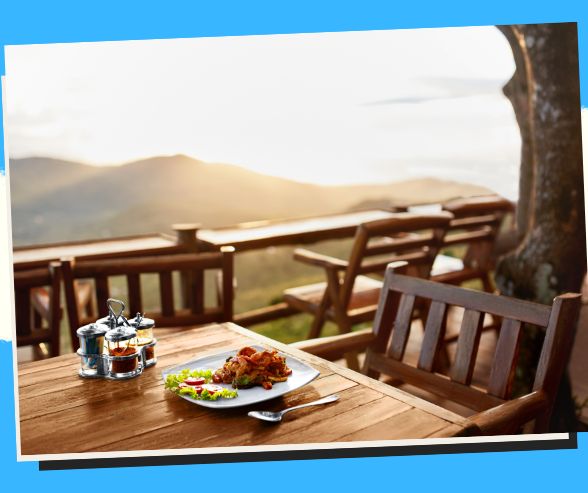
🍽️ The Art of Food Touring: Unveiling the Secrets of Local Flavors
Indulge in local delights with food tours, embarking on a gastronomic adventure. Let your taste buds travel the world as you savor delicious cuisines! 🍽️🌍
How-To Guide: Trying Local Cuisine and Food Tours 🌍🍴
Traveling the world isn’t just about exploring new landscapes; it’s about tasting the culture! 🥘✨ Food is a universal language, and every dish tells a story about the people, traditions, and history of a place. This guide will show you how to fully immerse yourself in the world of local cuisine through food tours and unforgettable dining experiences.
Introduction: Why Food Tourism Matters
From Italy’s creamy gelatos to Thailand’s spicy street food, local cuisine is a gateway to understanding a culture. Food tours provide a curated way to savor these flavors while meeting locals and uncovering culinary secrets.
Whether you’re a foodie or just adventurous, trying local dishes can transform a good trip into an extraordinary one. 🌟
Step 1: Researching Culinary Hotspots 🗺️
Before you travel, dive deep into the local food scene. Here’s how:
- Explore Online Resources: Read blogs, watch YouTube travel vlogs, or follow food-focused Instagram accounts for insider tips.
- Ask the Locals: Use apps like Couchsurfing or local Facebook groups to connect with people and ask about authentic dishes.
- Check Reviews: Websites like TripAdvisor, Google Reviews, or Yelp are goldmines for recommendations.
💡 Pro Tip: Make a list of must-try dishes before you arrive so you don’t miss out!
Step 2: Picking the Perfect Food Tour
Food tours are curated experiences that offer insights into local ingredients, cooking techniques, and cultural stories. Choose the one that best suits your style:
- Walking Tours: Great for sampling street food while exploring the city. 🚶♂️
- Market Tours: Perfect for understanding the freshest local produce. 🥕
- Cooking Classes: Learn how to make traditional dishes and take recipes home. 🍳
- Gourmet Experiences: For those who want to dine in Michelin-starred restaurants or exclusive venues.
Questions to Ask Before Booking:
- What’s included in the price?
- Are dietary restrictions accommodated?
- Is it kid-friendly if you’re traveling with family?
Step 3: Must-Try Cuisines Around the World
Here are some iconic dishes and where to find them:
- Italy 🇮🇹
- Must-Try: Pizza Margherita, handmade pasta, and tiramisu. 🍕
- Pro Tip: Visit Naples for authentic pizza experiences.
- Japan 🇯🇵
- Must-Try: Sushi, ramen, and tempura. 🍣
- Pro Tip: Explore Tsukiji Market in Tokyo for fresh seafood.
- Mexico 🇲🇽
- Must-Try: Tacos al pastor, mole, and churros. 🌮
- Pro Tip: Food trucks and street vendors are often the best spots.
- Thailand 🇹🇭
- Must-Try: Pad Thai, green curry, and mango sticky rice. 🍛
- Pro Tip: Take a floating market tour for unique tastes.
- France 🇫🇷
- Must-Try: Croissants, escargot, and boeuf bourguignon. 🥐
- Pro Tip: Explore Parisian patisseries for the best desserts.
Step 4: Mastering the Art of Ordering Local Food
Ordering local food can sometimes feel intimidating, especially if there’s a language barrier. Here’s how to navigate:
- Learn Key Phrases: Memorize basic phrases like “What do you recommend?” or “Does this contain [ingredient]?”
- Example: “Qu’est-ce que vous recommandez ?” (French for “What do you recommend?”)
- Ask for Specials: Most restaurants have off-menu items that locals love.
- Be Open-Minded: Don’t shy away from trying unusual ingredients; they might surprise you!
💡 Pro Tip: Use translation apps to understand menus and communicate with staff.
Step 5: Etiquette and Dining Customs Around the Globe
Respecting dining customs enhances your experience and helps you blend in with the locals.
- Japan: Slurping noodles is a sign of enjoyment. 🍜
- India: Eating with your right hand is customary. 🖐️
- Middle East: Always accept tea or coffee when offered—it’s a gesture of hospitality. ☕
- Spain: Dinner often starts late, around 9 PM or later. 🕘
Step 6: Capturing the Moment (Without Annoying Others) 📸
Food memories are worth preserving, but it’s important to be respectful.
- Do: Take quick photos before eating.
- Don’t: Use flash or disrupt the dining atmosphere.
- Do: Share your experiences on social media with hashtags like #FoodieAdventures.
Step 7: Staying Safe While Exploring New Cuisines
- Start Slow: If you’re not used to spicy or rich foods, try small portions first. 🌶️
- Stay Hydrated: Especially when indulging in salty or spicy dishes. 💧
- Be Careful with Street Food: Ensure the stall is clean and food is freshly prepared.
💡 Pro Tip: Pack antacids or digestive aids if you have a sensitive stomach.
Step 8: Supporting Local Communities Through Food Tourism
When you invest in local cuisines, you help sustain small businesses and preserve traditions.
- Eat at Family-Owned Restaurants: These often serve authentic recipes passed down generations. 👨🍳
- Buy Locally-Made Products: Souvenirs like spices, sauces, or wines make great gifts. 🛍️
- Tip Generously: In places where tipping is customary, it’s a great way to show appreciation.
Step 9: Sustainability and Responsible Eating 🌱
Be mindful of the environmental impact of your food choices.
- Choose Seasonal Dishes: They are fresher and have a lower carbon footprint.
- Avoid Overfishing: Be cautious about eating endangered seafood. 🐟
- Carry Reusable Utensils: Reduce waste by bringing your own chopsticks, straws, or napkins.
Step 10: Making the Most of Food Tours 🍴
- Arrive Hungry: Food tours often have multiple stops; don’t fill up beforehand!
- Ask Questions: Learn about the history and preparation of each dish.
- Mingle: Food tours are great opportunities to meet fellow travelers.
🌟 Benefits of Trying Local Cuisine and Food Tours
- Cultural Connection 🌏
Local dishes tell stories of history, geography, and heritage, fostering a deeper connection to the culture. - Unique Flavors 🍜
Discover tastes and textures you can’t find anywhere else, from spicy curries to tangy ceviche. - Support for Local Economy 💰
Dining at local establishments and joining food tours directly benefit small businesses and communities. - Social Interaction 👫
Food tours create opportunities to meet locals and fellow travelers, sparking new friendships. - Memorable Experiences 🎉
Sampling street food in Bangkok or savoring paella in Valencia creates memories that last a lifetime. - Cooking Inspiration 🍳
Learning about unique ingredients and cooking methods can inspire your culinary adventures at home. - Promotes Sustainable Tourism 🌱
Many food tours focus on locally sourced and sustainable ingredients, reducing the travel footprint. - Encourages Adventurous Eating 🍣
Step out of your comfort zone by trying exotic dishes like escargot, balut, or alligator meat. - Insight Into Daily Life 🏠
Food reflects the daily lives of locals—what they eat, how they eat, and why they eat it. - Pure Joy ❤️
Let’s face it: food just makes us happy. The joy of discovering something delicious is universal.
📚 Case Studies of Travelers Who Fell in Love with Food Tours
- The Picky Eater Turned Adventurer 🍕🍜
Emma, hesitant about exotic foods, joined a food tour in Vietnam and discovered her love for pho and banh mi. - The Couple’s Culinary Bond 🍷
James and Sarah celebrated their anniversary with a wine-and-cheese pairing tour in Bordeaux, France. - The Solo Traveler’s Discovery 🥟
Maria explored Shanghai’s dim sum alleys and made friends with locals who shared their food stories. - The Family Experience 🍧
The Johnsons took their kids on a gelato-making tour in Italy, combining fun and flavor. - The Street Food Lover 🌮
Carlos embraced the vibrant chaos of Mexico City’s street food scene, indulging in tacos, al pastor, and churros. - The Historical Foodie 🍖
Clara explored Istanbul’s spice markets and Ottoman-inspired dishes, blending history with culinary delights. - The Vegan Explorer 🥗
Maya found vegan-friendly gems on a plant-based food tour in Bali, proving there’s something for everyone. - The Chef in Training 🍳
Liam joined a cooking class in Thailand, mastering the art of making authentic green curry. - The Sweet Tooth 🍩
Rachel uncovered hidden patisseries in Paris, indulging in éclairs, macarons, and mille-feuille. - The Adventurous Eater 🐙
David tried takoyaki (octopus balls) in Japan and found joy in embracing the unexpected.
🗝️ Key Takeaways
- Food Reflects Culture: Cuisine tells the story of a region’s history, climate, and traditions.
- Food Tours Are Educational: They teach you about ingredients, cooking techniques, and cultural significance.
- Diverse Palates: Every destination offers a unique flavor profile—sweet, sour, salty, or umami.
- Ask About Ingredients: Understanding what goes into a dish enriches the experience.
- Local Guides Are Gold: Guides provide insider knowledge about hidden gems and must-try dishes.
- Street Food is a Must: It’s affordable, authentic, and bursting with flavor.
- Support Ethical Tours: Choose tours that prioritize local businesses and sustainability.
- Bring an Appetite: Come hungry—you’ll want to try everything!
- Capture the Moment: Photos of your food adventures are souvenirs you can always relive.
- Step Outside Comfort Zones: The best culinary experiences often come from trying the unexpected.
❓ FAQs with Answers
1. What are food tours?
Food tours are guided experiences where you visit multiple eateries, markets, or stalls to sample local dishes.
2. Are food tours expensive?
Prices vary. Some cost as little as $20, while high-end tours can reach $200+. It depends on the location and inclusions.
3. Is street food safe to eat?
Generally, yes. Look for vendors with high turnover and freshly prepared food.
4. Can dietary restrictions be accommodated?
Many tours offer vegetarian, vegan, or gluten-free options—just inform them in advance.
5. What should I wear on a food tour?
Comfortable clothes and walking shoes are best, as many tours involve exploring on foot.
6. Do I need to book food tours in advance?
It’s recommended, especially during peak travel seasons or for popular tours.
7. How can I find authentic food experiences?
Research online, ask locals or use apps like Yelp, TripAdvisor, or Google Maps.
8. What if I don’t like a dish?
It’s okay! The goal is to explore. Politely decline and move on to the next tasting.
9. Are food tours family-friendly?
Absolutely! Many tours cater to families, offering kid-friendly stops and activities.
10. What’s the best food tour destination?
It depends on your preferences! Popular spots include Italy for pasta, Japan for sushi, and Thailand for street food.
Conclusion: Food Is the Soul of Travel
Trying local cuisine and embarking on food tours isn’t just about satisfying your taste buds—it’s about connecting with the heart and soul of a culture. 🌍 Every dish tells a story, every market hums with life, and every bite leaves you craving more adventures.
So, pack your appetite, embrace your curiosity, and let the world be your buffet. Bon appétit, or as they say in Thailand, “Aroy mak!” 🍽️✨
Where will your culinary journey take you next? 🚀 Share your food adventures and inspire others to explore!
Key Phrases
- “Global food tours”
- “Local cuisine adventures”
- “Savoring authentic flavors”
- “Exploring cultural dishes”
- “Best food tours worldwide”
- “Tasting traditional cuisines”
- “Local food guide”
- “Iconic dishes around the world”
- “Culinary travel experiences”
- “Food tourism highlights”
Best Hashtags
- #FoodieTravel
- #TasteTheWorld
- #LocalCuisine
- #FoodTours
- #CulinaryAdventure
- #AuthenticFlavors
- #SavorTheWorld
- #TravelForFood
- #GastronomicJourney
- #FoodLoversUnite
Check the list of the top and best 400 travel recreation and leisure activities.
DisclaimerThe information is for educational purposes only and subject to change, and it is highly recommended to consult local authorities for the latest and most accurate updates. We do not constitute endorsement of any specific technologies or methodologies or endorse of any specific products or services.📩 Need to get in touch?Feel free to Email TravelingSmartly.com for comments, suggestions, reviews, or anything else. |








Comments (0)